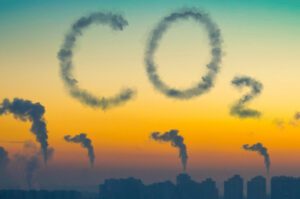
Shifting the burden of financing decarbonization onto taxpayers would be wrong, Ambassador of the European Union (EU) to Ukraine Matti Maasikas expressed this position at the discussion titled “Decarbonization. What is the Ukrainian way?”
“The polluter must pay. The authorities must work more boldly with this,” the ambassador said.
According to him, the payment for CO2 emissions is EUR 0,15 per tonne in Ukraine, while over EUR 50 in the EU.
First Deputy CEO of Interpipe Denys Morozov said that business is ready to invest in decarbonization, but with the support of the government, these efforts will have a greater effect. Morozov said the company made the largest environmental investment of about $1 billion without government support ten years ago, when no one spoke about Green Deal, having built an innovative electric steel-smelting complex Interpipe Steel instead of the environmentally dirty open-hearth production and reducing CO2 emissions by ten times.
According to him, Interpipe, which exports 85% of its products, is increasingly receiving requests for environmental audits from its customers, and now the company is completing the development of a long-term Decarbonization Strategy.
“Despite the presence of a modern metallurgical plant that meets all EU environmental standards, we still need support from the government. First of all, it concerns the availability of scrap metal, which is a critical raw material for decarbonization,” Morozov said. He called for leaving all scrap in Ukraine, since without it the country will not be able to decarbonize metallurgy and achieve the goals of the Green Deal.
The second problem, he called the lack of sufficient industrial access to cheap low-carbon and “green” electricity, in particular, nuclear power plants.
DTEK Executive Director Dmytro Sakharuk said the main requirement for the state is predictability.
“Long-term investments need a stable environment […]. We are ready to pay, but we need trust [in the actions of the authorities] and stability,” he said.
According to Sakharuk, the reduction of feed-in tariffs resulted in almost 1 GW of green electricity not being generated in 2021 and an additional 2 million tonnes of CO2 will be emitted.
Deputy Prime Minister for European and Euro-Atlantic Integration Olha Stefanishyna said it is important for business to get a strategy and the government is working on its own Ukrainian Green Deal.
She said there is a clear understanding of the need for financial resources for such a green transition, and this is also one of the government’s priorities.
According to Minister of Environmental Protection and Natural Resources Roman Abramovsky, Ukraine has already managed to agree on the idea of a Ukrainian Climate Fund, similar to the Energy Efficiency Fund, with the European Bank for Reconstruction and Development (EBRD), and by the end of September such an agreement can be completed with the World Bank.
According to Morozov and Sakharuk, one of the directions for using the fund’s resources could be compensation for interest rates, since in Ukraine they are significantly higher than in Europe. As the head of the Ecology Ministry said, it is possible.
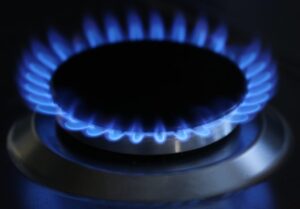
The price of the nearest futures contract on the Dutch TTF spot index for ICE Futures, for October, continued to grow on Monday, assuming the value of 49.26 euros per kWh or $600 per thousand cubic meters, according to the exchange’s data.
Trading on Friday finished up at the value of $586 per thousand cubic meters.
The new gas year begins from October. Gazprom has a long-term reservation of transit capacities through the Yamal-Europe gas pipeline until the end of September. The Russian company did not book capacities of the pipeline at past annual and quarterly auctions.
The launch of the almost completed Nord Stream 2 gas pipeline is expected toward the end of this year. Issues concerning regulation of the pipeline’s operation are currently under consideration of the relevant controlling bodies.
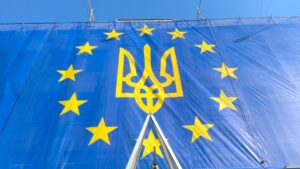
In order to become a full member of the European Union, Ukraine will have to work hard for 20 years, said Estonian President Kersti Kaljulaid.
In an interview with European Truth, the politician stated that neither Ukraine, nor Georgia, nor Moldova still meet the requirements for membership in the European Union.
“The EU has many conditions. And frankly speaking, none of these countries is ready to fulfill the EU criteria. So, it will be 20 years, maybe, to work before you get there. All these countries have problems with independent justice systems. Therefore, you don’t qualify for European membership,” Kaljulaid said, adding that some “intermediate cooperation format” could help these states on the way to European integration.
The Estonian President also noted that the EU should have been somewhat more courageous in expanding its borders, in particular, the Union could offer Kyiv, Tbilisi and Chisinau either a new format of work for countries that have ambitions to join the EU, or full membership, however it will take “a lot of time”.
In addition, answering a question about joining NATO, Kaljulaid noted that Ukraine would not be able to become a full member of the Alliance until it regains control of all the occupied territories.
“Estonia is a strong proponent of MAP and for Ukraine to work closely with NATO, but we don’t know exactly when we will arrive at this end. We need to wait for some time for the history to turn,” she stressed.
She also expressed hope for a peaceful solution to the issue of de-occupation of Ukrainian territory.

Prime Minister Denys Shmyhal believes that Ukraine has fulfilled the conditions necessary for the disbursement of the second tranche of macro-financial assistance from the European Union, the press service of the Cabinet of Ministers said on Sunday.
“Indeed, an important step in supporting us will be the allocation of the second tranche of macro-financial assistance before the completion of the current program in September this year. Ukraine has met all the conditions for receiving it,” Prime Minister of Ukraine Denys Shmyhal said during a meeting with Executive Vice President of the European Commission Valdis Dombrovskis.
According to the Prime Minister, Ukraine has increased the transparency and efficiency of medical procurement, continued pursuing the reform of tax and customs services, and resumed the competitive procedure for selection for civil service positions.
Shmyhal also noted that the government has taken important steps to improve the anti-corruption infrastructure. Also, the Bureau of Economic Security was created, the functioning of the natural gas market was improved, and the reform of the corporate governance system of state-owned enterprises continues.
For his part, the Executive Vice President of the European Commission noted that the European Union has mobilized unprecedented financial and technical assistance for Ukraine. And the provision of the first tranche of macro-financial assistance in the amount of EUR 600 million in 2020 had been a sign of solidarity between the EU and Ukraine.
“Ukraine has made significant efforts towards implementation of the EU macro-financial assistance conditions and based on the preliminary analysis we can consider conditions as broadly met,” Valdis Dombrovskis said.
In addition, the Prime Minister noted that Ukraine had ensured the implementation of structural “beacons” and within the framework of joint stand-by arrangement with the IMF, which are necessary for the first revision of the program.
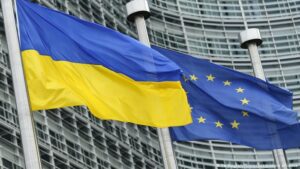
Some 54.6% of Ukrainians consider it harmful for Ukraine to receive a loan from the EU in the amount of EUR 1.2 billion under obligations to allow huge salaries for members of the supervisory boards of state-owned companies, which include many foreigners, to give foreigners an opportunity to procure medicines for Ukraine, to appoint approved people as heads of the tax, customs and judicial system, according to the results of the monitoring survey of the population of Ukraine “Dynamics of socio-political attitudes and assessments of the population of Ukraine” by the Social Monitoring Center. According to the survey presented at the Interfax-Ukraine agency on Tuesday, 19.3% of respondents consider this to be neither useful nor harmful. Some 13% called it useful, and 13.1% did not answer the question.
Some 75.5% of respondents do not support the obligations that the Ukrainian authorities undertook in the agreements with the International Monetary Fund (IMF) on the introduction of market prices for gas and heat for the population. Some 14.7% support the initiative, and 9.8% found it difficult to answer the question.
Some 82.7% indicated that they do not agree that the Ukrainian authorities, within the agreements with the IMF, undertake an obligation to reduce the number of schools and teachers. Some 9.4% agree with this and 7.9% did not answer the question.
Some 65.8% of respondents noted that they do not agree with the fact that, within the agreements with the IMF, the Ukrainian authorities undertake obligations to continue the reform of the health care system, known as the “Ulana Suprun Reform.” Some 20.4% of those surveyed agree with this and 13.8% found it difficult to answer.
Some 7.7% of respondents believe that the Ukrainian government is completely independent in its economic policy, 42.6% – “in some issues – independent, in others – it is influenced by other countries and international organizations,” 42.8% – “completely dependent on the influence of other countries and international organizations.” Some 6.9% found it difficult to answer.
Some 15.2% answered that inviting foreign citizens to work at Ukrainian authorities (Cabinet of Ministers, regional heads) and to manage Ukrainian state-owned companies (Ukrzaliznytsia, Naftogaz, etc.) was useful (15.2%). Some 28.4% indicated that neither useful nor harmful and 46.6% – harmful. Some 9.8% did not answer the question.
The survey was conducted from August 2 to August 11, 2021. Some 3,012 respondents took part in it. The method of collecting information is a personal interview at the place of residence of the respondent, the standard deviation is from 1.1% to 1.9%.
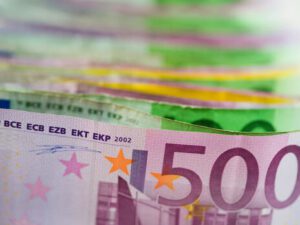
The EU will mobilize EUR 17 billion in investments for the Eastern Partnership countries to develop a more dynamic economy and society in the region, said EU Commissioner for Enlargement and Neighborhood Oliver Várhelyi.
Várhelyi said at a conference on Ukraine reforms, which is taking place in Vilnius on Wednesday, that he is in Georgia today, but glad that he can join the conference via video link. He said he was engaged in delivering a very positive message for the Eastern Partnership countries, including Ukraine, about a significant new economic and investment plan for the region, adding that they are mobilizing EUR 17 billion investment for the region, in order to build new, more sustainable and more dynamic economies and societies in the region.